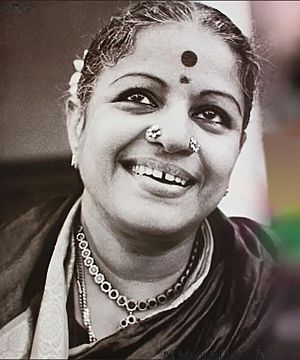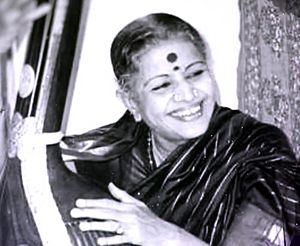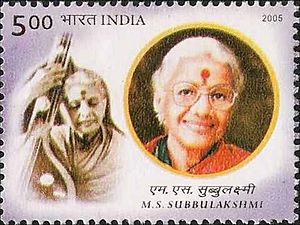M. S. Subbulakshmi facts for kids
Quick facts for kids
M. S. Subbulakshmi
|
|
|---|---|
 |
|
| Background information | |
| Birth name | Madurai Shanmukhavadivu Subbulakshmi |
| Born | 16 September 1916 Madurai, Madras Presidency, British India |
| Died | 11 December 2004 (aged 88) Chennai, Tamil Nadu, India |
| Genres | Indian classical music |
| Occupation(s) | Classical vocalist |
| Years active | 1930–1997 |
| Labels | HMV |
Madurai Shanmukhavadivu Subbulakshmi (born September 16, 1916 – died December 11, 2004) was a famous Indian singer. She specialized in Carnatic music, which is a type of classical music from South India.
M. S. Subbulakshmi was the first musician to receive the Bharat Ratna. This is India's highest award for civilians. She was also the first Indian musician to get the Ramon Magsaysay award in 1974. This award is sometimes called Asia's Nobel Prize. She was also the first Indian to perform at the United Nations General Assembly in 1966.
Contents
About M. S. Subbulakshmi
Her Early Life
Subbulakshmi, known as Kunjamma to her family, was born on September 16, 1916. Her birthplace was Madurai, in what was then British India. Her mother, Shanmukavadiver Ammal, was a veena player. Her grandmother was a violinist.
She began learning Carnatic music when she was very young. She also learned Hindustani music, another type of Indian classical music. Her family was very musical, which helped her learn and grow as an artist.
Subbulakshmi gave her first public performance at age eleven in 1927. This concert took place in a temple in Tiruchirappalli. She performed with famous musicians on the violin and mridangam (a drum).
Moving to Madras
In 1936, Subbulakshmi moved to Madras (now called Chennai). She also started acting in films. Her first movie was Sevasadanam in 1938.
Her Musical Journey
Becoming a Star Singer
M.S. Subbulakshmi started her classical music training with her mother. Later, she learned Hindustani classical music. She made her first music recording when she was just 10 years old.
In 1929, at age 13, Subbulakshmi performed at the important Madras Music Academy. This academy usually chose only experienced performers. But they invited her because she was so talented. Her performance was amazing and made her very popular. Soon, she became one of the top Carnatic singers.
By the time she was seventeen, Subbulakshmi was giving her own concerts. She performed at major venues like the Madras Music Academy.
She traveled all over the world as India's cultural ambassador. She performed in London, New York, Canada, and other places. Some of her most famous concerts were:
- At the Edinburgh International Festival in 1963.
- At Carnegie Hall in New York.
- At the United Nations General Assembly in 1966.
- At the Royal Albert Hall in London in 1982.
- At the Festival of India in Moscow in 1987.
After her husband, Kalki Sadasivam, passed away in 1997, she stopped performing in public. Her last concert was in 1997. M. S. Subbulakshmi died on December 11, 2004, in Chennai.
Her Film Roles
M.S. Subbulakshmi also acted in a few Tamil films when she was young. Her first movie, Sevasadanam, came out on May 2, 1938. It was a big success.
Sevasadanam was one of the first Tamil films to talk about social issues. It showed the problems of young girls marrying much older men. The movie helped bring about social change.
M.S. Subbulakshmi also played a male role, Narada, in the film Savitri (1941). She did this to help raise money for her husband's magazine, Kalki. Her most famous film role was playing the saint-poetess Meera in the 1945 film Meera. This movie made her famous across India. It was later remade in Hindi in 1947.
Here are some of the films she acted in:
| Year | Film | Language | Role | Director |
|---|---|---|---|---|
| 1938 | Sevasadanam | Tamil | Sumathi | K. Subramanyam |
| 1940 | Sakuntalai | Tamil | Shakunthala | Ellis R. Dungan |
| 1941 | Savithiri | Tamil | Saint Narada | Y. V. Rao |
| 1945 | Meera | Tamil | Meerabai | Ellis R. Dungan |
| 1947 | Meerabai | Hindi | Meerabai | Ellis R. Dungan |
Awards and Special Recognitions
Many important people praised M.S. Subbulakshmi. Jawaharlal Nehru, who was India's first Prime Minister, called her "a Queen of Music." Famous singer Lata Mangeshkar called her Tapaswini, meaning "the Renunciate." Another great singer, Ustad Bade Ghulam Ali Khan, called her Suswaralakshmi, which means "the goddess of the perfect note."
She was known for her beautiful singing of bhajans (Hindu hymns). Some of her famous renditions include Bhaja Govindam and Vishnu sahasranama (1000 names of Vishnu). She also sang the Venkateswara Suprabhatam, which are musical hymns to wake up Lord Balaji in the morning.
M.S. Subbulakshmi received many awards and honors:
- Padma Bhushan in 1954
- Sangeet Natak Akademi Award in 1956
- Sangeetha Kalanidhi in 1968
- Ramon Magsaysay award in 1974
- Padma Vibhushan in 1975
- Kalidas Samman in 1988
- Indira Gandhi Award for National Integration in 1990
- Bharat Ratna in 1998
She was also honored as a special artist at the Tirumala Tirupati Devasthanams temple. A bronze statue of her was put up in Tirupati in 2006.
A special shade of Kancheepuram Saree, a type of traditional Indian saree, was named "MS Blue" after her. This shows how much she was loved and respected.
In 2005, a postage stamp was released in India to honor her. The United Nations also decided to issue a stamp to mark her 100th birthday.
M.S. Subbulakshmi often donated the money she received from awards and concerts to charity. She gave more than 200 charity concerts and raised a lot of money for good causes. She was a very kind and giving person.
Images for kids
See also
 In Spanish: M. S. Subbulakshmi para niños
In Spanish: M. S. Subbulakshmi para niños





